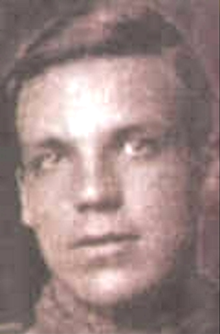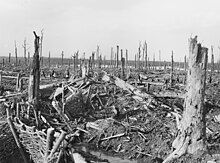Herbert Burden
Herbert Burden | |
|---|---|
 | |
| Birth name | Herbert Francis Burden |
| Born | 22 March 1898 Lewisham, London, England |
| Died | 21 July 1915 (aged 17) Ypres, Belgium |
| Cause of death | Execution by firing squad |
| Buried | Unknown |
| Allegiance | British Expeditionary Force |
| Years of service | 1913/4–1915 |
| Rank | Private |
| Service number | 3832 / 11012 |
| Unit | East Surrey Regiment South Northumberland Fusiliers |
| Battles/wars | World War I
|
| Awards | One medal, unknown |
| Memorials | National Memorial Arboretum |
Herbert Francis Burden (22 March 1898 – 21 July 1915) was a soldier in the
Early life
Herbert Burden was born on 22 March 1898,
Question of wartime identity
Precisely establishing Burden's identity has proved somewhat problematic for historians. Service records for a Herbert Francis Burden of the Northumberland Fusiliers have never been found. A large number of records of servicemen from the First World War were lost during the 1940
Burden lied about his age when he enlisted, as he was 16 years old at the time;[6][note 2] officially, the minimum age was 19.[9] Then in March the following year—when his records would have shown him to have turned 19, he was transferred to the BEF.[2] Attempting to clarify the confusion between the two possible Burdens, two recent scholars have suggested that the two men who joined both the East Surreys and the Northumberland Fusiliers were the same individual. They have suggested that he joined the Fusiliers in May 1914 ("aged 16 years and two months, but lied about his age, saying he was 18 years and two months old") and soon deserted. He returned to London and then enlisted with the East Surreys in November.[2] He was three weeks into his career with this second regiment, based in Dover Castle barracks, when in December 1914 he deserted again.[2] A Court of Inquiry was there on 11 January 1915 to investigate Burden's absence. It declared that[4]
No 11012 Pte H Burden, 3rd East Surrey Regiment absented himself without leave from his Commanding Officer at Shaft Barracks, Dover on the 14th December 1914, that he is still illegally absent for a period exceeding 21 days and that on the 14th December 1914, he was deficient and still is so deficient of the following articles: Ammunition, Equipment, Instruments, Regimental Necessaries or Clothing of No 11012 Pte H Burden, 3rd East Surrey Regiment.[4]
For some reason, Burden returned to his original regiment.[2] No satisfactory explanation, it has been said, exists as to why Burden "joined the Northumberland Fusiliers, deserted, joined another battalion and deserted yet again".[11]
Military career

It was with the South Northumberland Fusiliers that he travelled to France.[2] His battalion arrived in France at the end of March 1915.[1] Burden fought on the front line for ten months.[12] His battalion fought at the bitterly contested Battle of Hooge in November 1914, in which both the British and German armies had suffered high losses.[6][note 3] It is uncertain whether Burden took part. At his later court-martial, it was implied by senior officers that he had not, and that, indeed, that the only action he had seen was "the usual trench sniping" and a couple of patrols only.[14] During this period, he breached the army's disciplinary code on multiple occasions, which included unauthorised absences.[15] However, at some point he won a medal because it was subsequently forfeited by his conviction for desertion, a detail noted as such in the Medal Roll of the Northumberland Fusiliers.[14]
Burden was still on the
Desertion
Burden by now had "undergone the usual nerve-shattering baptism of shelling in the trenches",[3] and having seen friends killed at the Battle of Belwaarde Ridge, was sent to a military hospital.[3] Discharged
on the afternoon of 26 June
Court-martial and execution
[Burden] had an expanded chest measurement of 36 inches (91 centimetres). His complexion was given as "fresh" with dark brown hair and hazel eyes. The doctor described his physical development as "good".[note 5] He also appears to have had two tattoos, one on his right upper arm and another on his left forearm, of clasped hands and "Love Lilly" respectively.[2]
Within two days of his capture, Burden was
A number of factors have been subsequently raised in mitigation of Burden's circumstance: "his age, the alleged impact of the casualties suffered by his battalion at Bellewaarde Ridge, the fact that he had no defence at his trial as all who could speak for him were killed, and that his absence had been a classic case of AWOL, not desertion".[15] Yet his unsatisfactory record in his few months of active service undoubtedly told against him; "unfortunately, Pte Burden had a bad record". This included at least seven cases of AWOL, in both England and France, and various other disciplinary offences. He also compounded his situation on at least one occasion by going sick the day after being meted out a punishment.[14] In August 1915 the local Catford Journal newspaper reported him as being among nine local men who had recently been
Memorialised


The
In 2006 the
The poet Ian Duhig has memorialised Burden in a poem called The Stake.
Notes
- ^ A late 19th-century carman was described contemporaneously as the "driver of any cart, wagon, or other carriage in which coals shall be carried in sacks for delivery to the purchaser or purchaser; thereof, from any ship, lighter, barge, or other craft, or from any wharf [or] warehouse".[5]
- University of Kent at Canterbury, who have described them as "unconvincing".[9] Hughes-Wilson and Corns have noted that "young men have always joined the army underage", and that the context of early-19th-century England was that by the age of 18 a boy—who had almost certainly left school at 14—"would regard himself as a man of the world" by 18. Also, although civil registration of births had been required since 1837, this was still not universally adhered to; many people did not possess a birth certificate, and could be "were quite unaware of their true age".[10]
- ^ The British gained 250 metres of an 800-metre front line, capturing a couple of hundred prisoners and three machine guns from the Germans, upon whom they inflicted heavy casualties ("although probably not", it has been suggested, "more than half those of the British")[13]
- ^ Indeed, the first British soldier to have been executed in the First World War, Thomas Highgate, was from Catford. The road where he had lived, Brookdale Road, was close to Burden's own house in Dogget Road. Hughes-Wilson and Corns thus conclude that it is perfectly possible that they had known each other as civilians.[18]
- ^ At his court-martial, however, Burden's commanding officer described him as having "an inferior physique".[2] This could be either that he was still a youth, or because he was an "undernourished town-dweller".[14]
- Loyal North Lancashire Regiment. He was one of the only young men facing a capital charge who told the court-martial his true age. This was 18, two years younger than his registered age, "and yet this was not sufficient to reduce his sentence".[20]
References
- ^ a b c Saunders 2004, p. 144.
- ^ a b c d e f g h i j k l m Hughes-Wilson & Corns 2001, p. 297.
- ^ a b c d Kent 2013, p. 132.
- ^ a b c Geograph 2016.
- ^ Adolphus & Ellis 1874, p. 444.
- ^ a b c d Johnson 2015, p. 130.
- ^ Emden 2012, p. x.
- ^ Oakes 2009, p. 27.
- ^ a b Beckett, Bowman & Connelly 2017, p. 128.
- ^ Hughes-Wilson & Corns 2001, pp. 288–289.
- ^ Hughes-Wilson & Corns 2001, p. 298.
- ^ a b c d e f BBC News 2006.
- ^ McEntee-Taylor 2014, p. 193.
- ^ a b c d e f Hughes-Wilson & Corns 2001, p. 295.
- ^ a b c d Sokolowska-Paryz 2012, p. 56.
- ^ Dixon 2003, p. 267.
- ^ a b c d e Hughes-Wilson & Corns 2001, p. 294.
- ^ a b c Hughes-Wilson & Corns 2001, p. 299.
- ^ Hughes-Wilson & Corns 2001, p. 293.
- ^ Hughes-Wilson & Corns 2001, pp. 303–304.
- ^ CWGC 2018.
- ^ BBC News 2001.
- ^ Johnson 2015, p. 149.
- ^ Sokolowska-Paryz 2012, p. 55.
- ^ Kent 2013, p. 133.
- ^ a b Norton-Taylor 2006.
- ^ Fenton 2006.
Bibliography
- Adolphus, J. L.; Ellis, T. F. (1874). Report of Cases Argued and Determined in the English Courts of Common Law. Court of Queen's Bench. Vol. XI. Philadelphia: T & J. W. Johnson & Co. OCLC 4360713.
- BBC News (21 June 2001). "Tribute to WWI 'cowards'". BBC. from the original on 14 January 2013. Retrieved 10 July 2018.
- BBC News (16 August 2006). "Shot at dawn, pardoned 90 years on". BBC. from the original on 12 July 2012. Retrieved 10 July 2018.
- Beckett, I.; Bowman, T.; Connelly, M. (2017). The British Army and the First World War. Armies of the Great War. Cambridge: Cambridge University Press. ISBN 978-1-10700-577-8.
- CWGC (2018). "Private Burden, Herbert Francis". Commonwealth Graves Commission. Archived from the original on 14 July 2018. Retrieved 14 July 2018.
- Dixon, J. (2003). Magnificent But Not War: The Battle for Ypres, 1915. Barnsley: Pen and Sword. ISBN 978-1-84415-002-1.
- Emden, Richard van (2012). Boy Soldiers of the Great War. London: Bloomsbury. ISBN 978-1-40882-472-6.
- Fenton, B. (16 August 2006). "Pardoned: the 306 soldiers shot at dawn for 'cowardice'". The Telegraph. from the original on 21 April 2013. Retrieved 14 July 2018.
- Geograph (2016). "SK1814 : Herbert Francis BURDEN". Geograph. Archived from the original on 14 July 2018. Retrieved 14 July 2018.
- Hughes-Wilson, J.; Corns, C. M. (29 October 2001). Blindfold and Alone. London: Orion. ISBN 978-1-47460-319-5.
- Johnson, J. (2015). Executed at Dawn: British Firing Squads on the Western Front 1914–1918. Stroud: History Press. ISBN 978-0-7509-6552-1.
- Kent, G. (2013). On the Run: Deserters Through the Ages. London: Biteback Publishing. ISBN 978-1-84954-637-9.
- McEntee-Taylor, C. (2014). The Battle of Bellewaarde, June 1915. Barnsley: Pen and Sword. ISBN 978-1-78340-052-2.
- Norton-Taylor, R. (15 August 2006). "Executed WW1 soldiers to be given pardons". The Guardian. from the original on 14 July 2018. Retrieved 14 July 2018.
- Oakes, J. (2009). Kitchener's Lost Boys: From the Playing Fields to the Killing Fields. Stroud: History Press. ISBN 978-0-75247-576-9.
- Saunders, N. J. (2004). Matters of Conflict: Material Culture, Memory and the First World War. Routledge. ISBN 978-0-41528-054-9.
- Sokolowska-Paryz, M. (2012). Reimagining the War Memorial, Reinterpreting the Great War: The Formats of British Commemorative Fiction. Newcastle-upon-Tyne: Cambridge Scholars Publishing. ISBN 978-1-44383-845-0.
